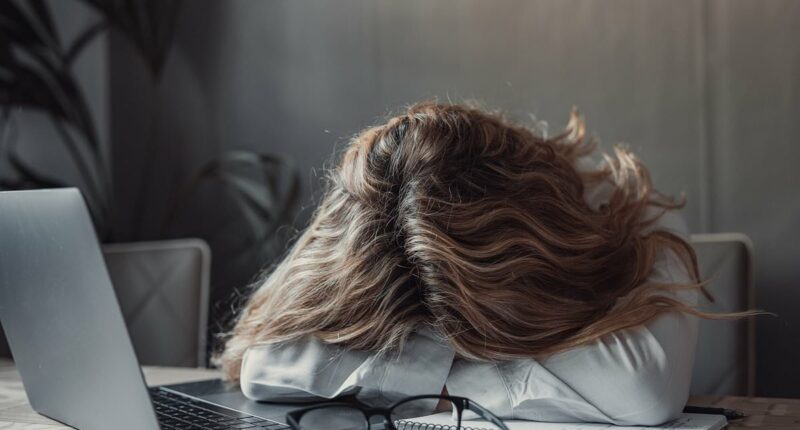Share this @internewscast.com
The 3pm fatigue is a common experience—and while you might think a day full of monotonous meetings is to blame for your depleted social energy, the actual reason could be much more personal.
Often, excessive tiredness during the day is due to inadequate sleep, with NHS guidelines indicating that adults require between seven and nine hours of quality sleep each night.
The elements for a restful night’s sleep are widely recognized: a dark room, a slightly cool climate, comfortable mattresses and pillows, and perhaps a touch of lavender spray to gently guide your nervous system to a peaceful sleep.
However, for many of us, our bedroom serves as more than just a sleep sanctuary; it’s where we lie and often spend hours scrolling on our phones, catching up on shows, or falling asleep to a movie.
And it’s this, according to one expert—and the NHS—is the reason for our daytime struggles.
Health authorities mention that watching TV in bed can ‘stimulate your body and diminish fatigue…it may impact sleep quality since your body loses the habit of associating bed with sleep.
‘Therefore, remove [the] TV from [the] bedroom.’
The governing body’s advice is echoed by Dr Hana Patel, from mattress brand Time4Sleep.

Falling asleep in the middle of the day could be due to sleep deprivation
She said: ‘I would generally advise against having a TV in your bedroom.
‘If you enjoy watching TV before sleeping, I recommend turning it off at least 30 minutes prior to bedtime to help the mind relax before you hit the sack.
‘If you do rely on the television to fall asleep, then I would recommend watching a program that is both visually and audibly relaxing, such as a nature documentary which includes lots of water or ocean sounds.’
There are no exact figures for how many Britons watch TV in bed, but Dreams found in their 2024 UK Sleep Survey that 52 per cent of respondents had a TV in their bedroom, and in 2022 Bensons for Beds found the bedroom was the second most popular place to watch TV.
There have been thousands of studies of linking too little sleep with scores of serious health issues, including kidney and heart disease, high blood pressure, diabetes and stroke.
It has also been shown to negatively impact memory and the ability to retain new information, potentially leading to dementia.
This is because during sleep, the brain clears out daily metabolic toxins and transfers short-term memories into long-term storage, solidifying learning.
Inadequate sleep disrupts these critical processes, which is why chronic sleep loss is strongly linked to an increased risk of neurodegenerative diseases like Alzheimer’s.

Oversleeping has links to heart disease, weight gain, diabetes, cognitive impairment and depression
Poor sleep, getting the wrong amount or having a sleep disorder like sleep apnea can shorten a person’s lifetime, with some studies showing it shaves off 4.7 years for women and 2.4 years for men.
However, sleeping too much can do just as much harm as sleeping too little, with oversleeping also having links to heart disease, weight gain, diabetes, cognitive impairment and depression.
Oversleeping is often a red flag that the quality of sleep is very poor or that an underlying health condition, such as sleep apnea, depression, brain damage or other chronic illnesses, is forcing the body to demand more rest in an attempt to recover.
Spending excessive time in bed can also disrupt the body’s natural sleep-wake rhythms, causing a groggy and disoriented feeling upon waking.
Earlier this week, a nurse shared why repeatedly hitting snooze in the mornings is incredibly bad for our nervous systems.
And yesterday, scientists pinpointed why some people are genetically predisposed to feel exhausted in the middle of the day—whether they have a TV in their bedroom or not.














